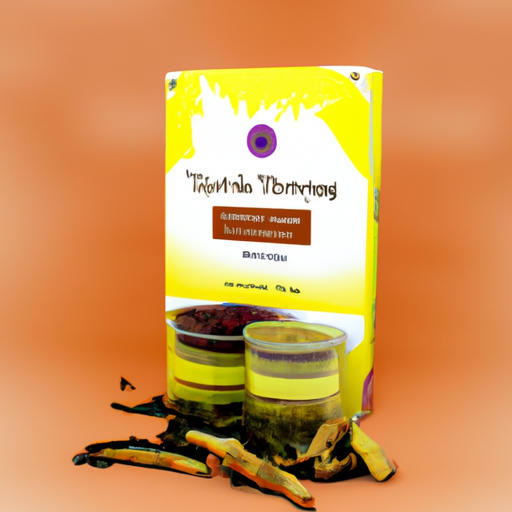As an individual with a long-standing curiosity in natural healing methods and alternative therapies, my interest was piqued upon discovering turmeric tea. Known for its extensive use in Ayurvedic healing spanning thousands of years, turmeric is a spice celebrated for its efficacy in addressing numerous health concerns, including digestive problems and skin ailments.
But what exactly does turmeric tea do for your body? As it turns out, there are many potential benefits. The active ingredient in turmeric is a compound called curcumin, which has powerful anti-inflammatory and antioxidant properties. These properties make turmeric an attractive option for anyone looking to improve their overall health and well-being.
In this article, we’ll explore some of the specific ways that drinking turmeric tea can benefit your body, from reducing inflammation to improving brain function. So grab a cup of tea (with a dash of turmeric!) and let’s dive in!
Key Takeaways
- Turmeric tea contains curcumin with anti-inflammatory and antioxidant properties, making it a natural remedy for chronic illnesses and reducing swelling and pain associated with inflammation.
- Turmeric tea can be easily prepared at home and is a cost-effective method of consuming curcumin daily to improve overall health.
- Consuming turmeric tea can improve cognitive function, memory, and attention span, and may even reduce the risk of Alzheimer’s disease.
- While turmeric tea offers many potential health benefits, precautions should be taken for certain populations and recommended dosages should be followed to avoid digestive issues or liver damage. Consult with a healthcare provider before starting any new supplement regimen.
Overview of Turmeric and Its Active Ingredient, Curcumin
If you’re looking to boost your overall health and wellness, turmeric tea might just be the answer. This drink contains an active ingredient called curcumin, which is known for its powerful anti-inflammatory and antioxidant properties.
While turmeric supplements are also available in the market, drinking turmeric tea is considered a more practical option since it can be easily incorporated into one’s daily routine. Compared to other turmeric products, such as capsules or powders, turmeric tea has been found to have higher bioavailability.
This means that our body can absorb and utilize curcumin better when consumed through the tea form rather than supplements. In addition, drinking turmeric tea can help improve digestion and prevent bloating due to its ability to stimulate bile production. Turmeric tea’s benefits go beyond improving digestion and reducing inflammation.
Its active ingredient curcumin has been extensively studied for its anti-inflammatory properties, making it a natural remedy for various chronic illnesses such as arthritis, heart disease, and cancer.
Anti-Inflammatory Properties of Curcumin
The anti-inflammatory properties of curcumin are like a soothing balm for the body’s internal inflammation. Curcumin has been shown to inhibit several molecules that play significant roles in inflammation, such as cytokines and enzymes like COX-2. This means that curcumin can help reduce swelling, pain, redness, and heat associated with inflammation.
However, it’s important to note that curcumin absorption and bioavailability are low when taken alone. Fortunately, combining turmeric with black pepper or fats can increase its absorption. Turmeric tea is an excellent way to incorporate turmeric into your diet as it contains both black pepper and healthy fats from ingredients like coconut milk. Alternatively, there are also supplements available on the market that have been formulated for better absorption.
In comparison to supplements, turmeric tea provides a more practical and cost-effective method of consuming curcumin daily. Additionally, drinking turmeric tea regularly has been shown to improve brain function and lower the risk of heart disease.
In the next section, we’ll explore another benefit of this amazing spice: its antioxidant properties.
Antioxidant Properties of Turmeric
I’m excited to talk about another amazing benefit of turmeric: its antioxidant properties. As we all know, oxidative damage can lead to a host of health problems like chronic inflammation and various diseases.
Fortunately, turmeric contains compounds that neutralize free radicals and prevent this damage from occurring. By incorporating this spice into our diets or drinking it as tea, we can lower our risk of developing these chronic conditions and improve our overall health.
Preventing Oxidative Damage to the Body
You can prevent oxidative damage to your body by regularly drinking turmeric tea. Turmeric contains a powerful antioxidant called curcumin, which fights against free radicals that can cause harm to the body’s cells. By consuming this spice in tea form, you’re able to protect your body from cellular damage and reduce the risk of premature aging.
Additionally, turmeric has been shown to boost the immune system by stimulating the production of white blood cells. These cells help fight off infections and illness, keeping you healthy and strong. By incorporating turmeric tea into your daily routine, you’re providing your body with an easy and natural way to support overall health and wellbeing.
As we move forward into the next section about reducing the risk of chronic diseases, it’s important to recognize that preventing oxidative damage is a crucial first step towards maintaining optimal health.
Reducing the Risk of Chronic Diseases
Get ready to discover an incredible way to significantly reduce your risk of chronic diseases with a simple addition to your daily routine. Turmeric tea has been found to have numerous preventive benefits that can help protect against a wide variety of illnesses and health conditions.
Here are just a few ways in which regular consumption of turmeric tea can aid in disease prevention:
-
Reducing inflammation: Chronic inflammation is linked to a range of diseases, including cancer, heart disease, and diabetes. Turmeric contains compounds that have anti-inflammatory properties, which may help lower the risk of these conditions.
-
Improving heart health: Studies have shown that turmeric can help improve cholesterol levels and reduce the risk of heart disease by reducing inflammation and oxidative stress.
-
Boosting immune function: The antioxidants in turmeric can help boost immune function by protecting against free radical damage and stimulating the production of white blood cells.
-
Lowering cancer risk: Some studies suggest that curcumin, the active compound in turmeric, may have anticancer effects by inhibiting tumor growth and preventing the spread of cancer cells.
Incorporating turmeric tea into your daily routine is an easy way to reap these preventive benefits for your overall health. Plus, there are additional benefits for brain health that we’ll explore next.
Benefits for Brain Health
I’m excited to discuss the benefits of turmeric for brain health.
Research has shown that consuming this spice can improve cognitive function, helping with memory and attention span.
Additionally, turmeric may reduce the risk of Alzheimer’s disease by reducing inflammation in the brain and promoting the growth of new brain cells.
Overall, incorporating turmeric into your diet is a simple and natural way to support your brain health.
Improving Cognitive Function
Turmeric tea can enhance your cognitive function by reducing inflammation in the brain and promoting the growth of new brain cells. This means that drinking turmeric tea regularly can improve mental clarity and memory, making it easier for you to focus and remember important information. Additionally, turmeric contains a compound called curcumin which has been shown to increase levels of a hormone called Brain-Derived Neurotrophic Factor (BDNF) which is essential for maintaining healthy neurons.
To enjoy the benefits of turmeric tea on cognitive function, try incorporating it into your daily routine. Here are three easy ways to do so:
- Add a teaspoon of ground turmeric to hot water with honey and lemon juice
- Brew a bag of turmeric tea in boiling water for 5 minutes
- Blend fresh turmeric root with ginger, coconut milk, and honey for a delicious latte-like beverage
Reducing the risk of Alzheimer’s disease is another benefit associated with regularly consuming turmeric tea.
Reducing the Risk of Alzheimer’s Disease
You can lower your risk of Alzheimer’s disease by incorporating turmeric tea into your daily routine. Alzheimer’s prevention is a crucial aspect of maintaining brain health, and turmeric has been shown to possess neuroprotective properties that could help ward off the development of this debilitating illness. In fact, research suggests that the active ingredient in turmeric – curcumin – may have potential therapeutic effects in treating various neurological disorders.
Curcumin works by reducing inflammation in the brain, which is thought to be one of the primary drivers behind Alzheimer’s disease. Additionally, it has been found to boost antioxidant levels while promoting healthy blood flow throughout the body. These benefits all contribute towards better cognitive function and an overall reduction in Alzheimer’s risk. So if you’re looking for a simple way to improve your brain health and potentially lower your chances of developing Alzheimer’s disease, consider adding a cup or two of turmeric tea to your daily routine.
Speaking about heart health…
Benefits for Heart Health
When it comes to heart health, turmeric tea has been shown to offer a range of benefits. It can help lower cholesterol levels, which is an important factor in preventing heart disease. Studies suggest that regular consumption of turmeric tea may also reduce the risk of developing heart disease in the first place.
As someone who wants to keep my heart healthy and strong, these findings make me feel even better about incorporating this flavorful and nutritious beverage into my daily routine.
Lowering Cholesterol Levels
Lowering your cholesterol levels can be as easy as sipping on a warm cup of turmeric tea each day, proving that an ounce of prevention is worth a pound of cure. Along with benefits of exercise and dietary changes, adding turmeric tea to your daily routine can help reduce the risk factors associated with heart disease.
Turmeric contains a compound called curcumin, which has been shown to have cholesterol-lowering effects. A study published in the Journal of Lipid Research found that curcumin helped reduce LDL (bad) cholesterol levels in mice by suppressing the production of certain enzymes involved in cholesterol synthesis. In addition, another study published in the journal Drugs in R&D found that taking curcumin supplements for eight weeks led to significant reductions in total cholesterol, LDL cholesterol, and triglycerides levels in humans. To reap these benefits, try drinking a cup of turmeric tea every day or adding turmeric powder to your meals.
By reducing our cholesterol levels through simple lifestyle changes such as drinking turmeric tea or exercising regularly, we can significantly decrease our risk for developing heart disease. The next section will explore more ways we can take proactive steps towards maintaining heart health.
Reducing the Risk of Heart Disease
One way to decrease the likelihood of heart disease is by implementing lifestyle changes. Among these changes, incorporating turmeric tea into your daily routine can provide cardiovascular benefits and improve heart health.
Turmeric contains a compound called curcumin that acts as an antioxidant and anti-inflammatory agent, which can help reduce the risk of developing heart disease. Studies have shown that consuming turmeric regularly may lower levels of inflammation in the body, which is often linked to the development of heart disease.
Additionally, curcumin has been found to improve blood vessel function and regulate blood pressure – both important factors for maintaining good cardiovascular health. By adding turmeric tea to your diet alongside other healthy lifestyle choices such as exercise and a balanced diet, you can take steps towards reducing your risk of heart disease.
As we’ve seen, incorporating turmeric tea into your daily routine can have significant benefits for heart health and overall well-being. However, its positive effects don’t stop there – next up we’ll explore how drinking turmeric tea can benefit digestive health.
Benefits for Digestive Health
You can improve your digestive health by regularly drinking turmeric tea. The active compounds in turmeric, notably curcumin, have been shown to help soothe inflammation and promote better digestion. Turmeric has also been found to stimulate the production of digestive enzymes that help break down food more efficiently.
Gut health is crucial for overall well-being, as it affects our immune system, mental health, and even skin health. Turmeric tea can play a role in supporting gut health by reducing inflammation and promoting the growth of beneficial gut bacteria. Studies have shown that curcumin can help prevent leaky gut syndrome, which occurs when the intestinal lining becomes damaged and allows toxins to enter the bloodstream.
Incorporating turmeric tea into your daily routine is an easy way to support your digestive system. Simply steep a teaspoon of ground turmeric in hot water for five minutes and enjoy! As you sip on this warm beverage, know that you’re nourishing your body from within.
Moving forward, let’s explore how turmeric tea can benefit our skin health.
Benefits for Skin Health
I’ve noticed that drinking turmeric tea has improved my skin health in a few ways. Firstly, it’s been helpful in fighting acne and other skin conditions. This is because turmeric has anti-inflammatory properties which can help reduce redness and swelling associated with pimples.
Secondly, I’ve noticed an improvement in my skin’s elasticity since drinking turmeric tea regularly. This is likely due to the antioxidant properties of curcumin, the active compound found in turmeric.
Fighting Acne and Other Skin Conditions
Turmeric tea’s anti-inflammatory properties can help reduce redness and inflammation associated with acne and other skin conditions. This natural remedy has been used for centuries in Ayurvedic medicine to treat various health issues, including skin problems.
Here are some of the benefits of turmeric tea for fighting acne and other skin conditions:
- Turmeric tea contains curcumin, a potent antioxidant that helps protect the skin from free radical damage.
- It has antibacterial and antifungal properties that can prevent infections on the skin.
- The anti-inflammatory effects of turmeric tea can calm down inflamed pimples, reducing their size and redness.
- Turmeric tea can also help regulate sebum production, preventing excess oil buildup on the skin that leads to breakouts.
- Drinking turmeric tea regularly can improve overall skin health by detoxifying the body and promoting healthy digestion.
By improving skin elasticity, we can enhance its youthful appearance.
Improving Skin Elasticity
As we learned earlier, turmeric tea has been proven to have benefits in fighting acne and other skin conditions. But did you know that it can also help improve your skin’s elasticity? This is because the active ingredient in turmeric, curcumin, has been found to improve hydration levels and boost collagen production.
Collagen is a protein that helps keep our skin firm and elastic. As we age, our bodies produce less collagen, which can lead to sagging and wrinkles. However, studies have shown that curcumin can stimulate the production of collagen in the body. Additionally, turmeric tea has natural anti-inflammatory properties that can reduce inflammation in the skin and promote healing.
As we move on to discussing the benefits of turmeric tea for joint health, it’s important to note that improving skin elasticity is just one of many ways this powerful spice can benefit our overall health and wellbeing.
Benefits for Joint Health
I’ve personally experienced the benefits of turmeric tea for my joint health. It’s been shown to reduce joint pain and inflammation, making it a great natural remedy for conditions like arthritis. Additionally, turmeric can improve mobility by reducing stiffness in the joints.
Incorporating turmeric tea into your daily routine may be an easy and effective way to support your joint health.
Reducing Joint Pain and Inflammation
Relieving joint pain and inflammation can be made easier with a regular dose of turmeric tea. As someone who has struggled with joint pain for years, I have tried various natural remedies and dietary supplements in search of relief. Turmeric tea is one of the few alternative medicine options that has consistently provided tangible benefits for my joint health.
Studies have shown that the active ingredient in turmeric, curcumin, possesses anti-inflammatory properties that can help reduce joint swelling and stiffness. In fact, a review of multiple studies found that curcumin was just as effective as non-steroidal anti-inflammatory drugs (NSAIDs) in reducing pain and inflammation associated with osteoarthritis. Incorporating a cup or two of turmeric tea into your daily routine is an easy and holistic approach to improving joint health and reducing discomfort.
Next up we’ll explore how turmeric tea can improve mobility without resorting to drastic measures.
Improving Mobility
Enhancing ease of movement can be achieved by regularly consuming turmeric tea, which has been shown to possess anti-inflammatory properties that alleviate joint swelling and stiffness. In addition to reducing inflammation, turmeric tea also helps improve mobility in several ways.
-
Promotes Flexibility: As we age, our muscles and joints tend to stiffen up, making it difficult to move around. Regular consumption of turmeric tea helps maintain flexibility by reducing inflammation and improving blood flow to the affected areas.
-
Enhances Strength: Weakness in the muscles supporting the joints can lead to instability and pain during movement. Some exercises for mobility, such as resistance training with weights or using resistance bands, can help build strength in these muscles and improve overall mobility.
-
Increases Range of Motion: Exercises that focus on stretching can increase range of motion in stiff joints. Incorporating yoga or Pilates into your routine can help you achieve greater flexibility and reduce discomfort associated with joint stiffness.
Incorporating turmeric tea into your daily routine along with appropriate exercises for mobility is a practical way to enhance your ease of movement and promote overall joint health. To learn more about how to make turmeric tea at home using simple recipes, read on!
How to Make Turmeric Tea
So, I want to share with you my favorite recipe for making turmeric tea.
First, gather the following ingredients: 1 teaspoon of turmeric powder, 2 cups of water, a slice of fresh ginger (optional), and honey or lemon juice to taste.
Next, bring the water to a boil in a small pot and add the turmeric powder and ginger slice. Let it simmer for about 10-15 minutes before straining out the solids.
Finally, add honey or lemon juice to taste and enjoy your healthy and delicious homemade turmeric tea!
Here are some tips for brewing and serving: use high-quality organic turmeric powder, steep longer for stronger flavor and greater health benefits, serve hot or cold depending on your preference.
Recipe for Turmeric Tea
To make a tasty cup of turmeric tea, you’ll need to gather some fresh ginger root, honey, black pepper, and of course, turmeric powder. Here’s a simple recipe that you can follow:
| Ingredients | Amount |
|---|---|
| Water | 2 cups |
| Turmeric | 1 tsp |
| Ginger root | 1 inch |
| Black pepper | A pinch |
| Honey | To taste |
Start by boiling water in a pot over medium heat. Add the grated ginger root and let it simmer for about five minutes. Then add the turmeric powder and black pepper into the pot and stir well. Let it steep for another five minutes before straining it into a cup. Add honey to taste.
Aside from its delicious flavor variations, turmeric tea has numerous health benefits that makes it an excellent addition to your daily routine. It is known for its anti-inflammatory properties which help alleviate pain caused by arthritis and other inflammatory conditions. It also aids digestion and boosts immunity due to its high antioxidant content. With all these amazing benefits, brewing and serving this superfood tea has never been more exciting!
Tips for Brewing and Serving
Brewing and serving turmeric tea is like creating a work of art – it requires attention to detail, patience, and the right tools. To get the most out of your turmeric tea experience, here are some brewing techniques and flavor variations that you can try:
- Use fresh ingredients: Fresh turmeric root will give your tea a stronger flavor than powdered turmeric. You can also add fresh ginger or lemon for added health benefits and taste.
- Steep at the right temperature: Boiling water may cause the bitter compounds in turmeric to be released, so instead use water heated to around 200°F (93°C) for steeping.
- Add honey or milk: If you find the taste too strong or bitter, adding honey or milk can help balance out the flavors.
By following these tips, you’ll be able to create a delicious cup of turmeric tea that’s perfect for any time of day. However, it’s important to keep in mind that there are precautions and potential side effects associated with consuming large amounts of turmeric.
Precautions and Potential Side Effects
Before incorporating turmeric tea into my daily routine, I wanted to educate myself on the potential precautions and side effects.
From my research, I found that it’s important to follow recommended dosages as excessive consumption can lead to digestive issues or liver damage.
Additionally, turmeric may interact with certain medications such as blood thinners and should be used cautiously in those populations.
It’s always important to consult with a healthcare provider before starting any new supplement regimen.
Recommended Dosages
If you’re looking to reap the benefits of turmeric tea, experts suggest a daily dosage of 500-2000mg. However, it’s important to note that the maximum intake recommended for long-term usage is 1500-2000mg per day.
Here are some additional guidelines to keep in mind when incorporating turmeric tea into your daily routine:
- Start with a lower dose and gradually increase as needed.
- Take turmeric with black pepper or a fat source to increase absorption.
- Avoid taking high doses if you’re pregnant or have gallbladder issues.
- Speak with your healthcare provider before taking turmeric supplements if you’re currently on any medications.
It’s crucial to be mindful of potential risks and side effects when consuming any supplement. Next, let’s explore how turmeric tea may interact with certain medications.
Interactions with Medications
Be aware that certain medications may interact with turmeric supplements, so it’s important to consult with your healthcare provider before adding turmeric tea to your daily routine.
Turmeric can increase the risk of bleeding when taken in conjunction with blood thinners such as warfarin or aspirin. Additionally, some medications may affect the liver’s ability to process turmeric, which can lead to potential risks for those with liver issues.
In some cases, dosage adjustments may be necessary if you are taking medication that interacts with turmeric. Your healthcare provider can help determine the appropriate dose and monitor any potential side effects.
It’s always better to err on the side of caution and seek medical advice before incorporating any new supplement into your routine. With proper guidance and monitoring from a healthcare professional, however, many people are able to safely enjoy the benefits of turmeric tea without experiencing any negative interactions.
This is particularly important when considering precautions for certain populations who may be at higher risk for complications from these interactions.
Precautions for Certain Populations
It’s important to note that certain populations, such as pregnant women and those with gallbladder issues, should exercise caution when consuming turmeric supplements. While turmeric is generally considered safe for most individuals, it can have adverse effects on certain groups of people.
Here are some pregnancy precautions and medication interactions to keep in mind:
-
Pregnancy Precautions: Pregnant women should avoid taking large amounts of turmeric supplements as it may stimulate the uterus or cause menstrual bleeding. Additionally, there isn’t enough research on the safety of turmeric during pregnancy, so it’s best to consult with a healthcare provider before using it.
-
Medication Interactions: Turmeric can interact with certain medications such as blood thinners and diabetes drugs. It can increase the risk of bleeding when taken with blood thinners and lower blood sugar levels when taken with diabetes medication. If you’re taking any prescription medications, talk to your doctor before incorporating turmeric into your routine.
-
Gallbladder Issues: Turmeric may worsen gallbladder problems by increasing bile production or causing contractions in the gallbladder. People with gallstones or other gallbladder conditions should also use caution when consuming turmeric supplements.
Overall, while turmeric tea offers many potential health benefits, it’s important to be aware of its potential risks and precautions for certain populations like pregnant women and those with gallbladder issues. Always speak to a healthcare professional before adding any new supplement or medication into your routine for personalized guidance and advice on what’s best for you.
Frequently Asked Questions
Can turmeric tea be consumed during pregnancy?
Regarding pregnancy safety, it’s generally safe to consume turmeric tea in moderate amounts. However, it’s important to consult with a healthcare provider before adding any new supplements or herbs to your diet during pregnancy.
It’s recommended to limit consumption of turmeric tea to 1-2 cups per day and avoid taking high doses of turmeric supplements as they may not be safe for pregnant women.
As always, it’s best to err on the side of caution when it comes to consuming anything during pregnancy and seek advice from a medical professional.
Is it safe to consume turmeric tea if you are on medication for a chronic condition?
As someone who takes medication for a chronic condition, I understand the importance of being cautious about what I consume. When it comes to turmeric tea, there are some potential drug interactions and dosage concerns that should be taken into consideration.
Turmeric can interact with certain medications such as blood thinners and diabetes medications, so it’s important to talk to your doctor before incorporating it into your routine. Additionally, high doses of turmeric may cause gastrointestinal issues or interact negatively with other medications.
As with any supplement or herbal remedy, it’s essential to do your research and consult with a healthcare professional before adding it to your regimen.
Can turmeric tea help with weight loss?
I was curious about whether turmeric tea could help with weight loss, so I did some research.
It turns out that there is evidence to suggest that drinking turmeric tea can aid in weight management.
Turmeric contains compounds called curcuminoids which have been shown to have anti-inflammatory and antioxidant properties.
These properties can help improve digestion and reduce inflammation in the body, both of which are important for maintaining a healthy weight.
Additionally, turmeric has been found to increase metabolism, leading to increased calorie burn throughout the day.
So if you’re looking for a natural way to support your weight loss goals, incorporating turmeric tea into your diet may be worth considering!
How often should one consume turmeric tea to reap its benefits?
To reap the benefits of regular turmeric tea consumption, it’s recommended to drink it daily. Many studies have shown that drinking at least one cup per day can provide numerous health benefits. Turmeric contains curcumin, a powerful anti-inflammatory compound that reduces inflammation and pain in the body. It also has antioxidant properties that protect against cellular damage and may even lower the risk of chronic diseases like cancer and heart disease.
Turmeric tea has also been linked to improved brain function and mood due to its ability to increase levels of BDNF, a hormone essential for maintaining healthy brain cells. Overall, incorporating turmeric tea into your daily routine can be an easy and enjoyable way to improve your overall health and well-being.
Is there a recommended time of day to consume turmeric tea for maximum benefits?
I recently discovered that the best time to consume turmeric tea for maximum effectiveness is in the morning. According to a study published in the Journal of Nutrition and Metabolism, drinking turmeric tea on an empty stomach can increase its bioavailability by up to 10 times!
To make this even better, there are so many delicious turmeric tea recipes available online that you can easily incorporate into your daily routine. From classic golden milk to spiced chai blends, there’s something for everyone.
So why not start your day with a warm cup of turmeric tea and enjoy its numerous health benefits throughout the day?
Conclusion
Overall, incorporating turmeric tea into your daily routine can provide numerous health benefits. The active ingredient, curcumin, has anti-inflammatory and antioxidant properties that can improve brain function, heart health, skin health, and joint health. Additionally, turmeric tea is easy to make at home and can be a delicious addition to your beverage lineup.
However, it’s important to note that while turmeric is generally safe for consumption in moderate amounts, excessive intake may lead to potential side effects such as nausea or diarrhea. It’s also important to consult with a healthcare professional before adding any new supplements or beverages to your diet.
With moderation and proper precautions, turmeric tea can be a great way to improve your overall health and wellbeing.










